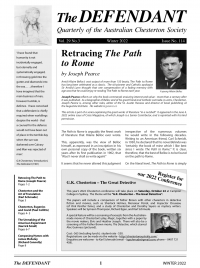Translating one language into another is a formidable task. The challenge is not simply one of language but of cultural assumptions and psychological expectations.
What are readers of the text looking for? Are their background beliefs earthbound or transcendental, social or spiritual? Are they inspired by a drive for knowledge or a yearning for reassurance and consolation?
G.K. Chesterton’s thoughts on translation took careful account of these questions. In his 1932 study of Chaucer, he shed light on the desirable purposes of a translation, as well as the difficulties that all translators face. In the chapter, “Chaucer and the Renaissance,” he argued that a translation should aim to convey the meaning and sense of the original, with as little changed as possible. This could mean keeping ancient words – such as the archaic English of Chaucer – since it “stands for a certain idea which was strong when the language was made, and it stands exactly where it did.”
Adopting a modern word “may bring in a nuance of change” which will expose the text to misunderstanding reflecting the cultural biases of a different age, and thus obscure the essential meaning of the original.
Capturing the magic and the song
At the same time, Chesterton highlighted the ultimate purpose of a translation, which is to try to reproduce the atmosphere of the original text. He criticised the overly literal rendering, focusing on a word-by-word approach, which allows “the style and the story [to] go forward energetically,” but fails to capture the magic. In Chesterton’s words, “we can translate anything in reason” but “cannot translate anything that is beyond reason.”
“What has vanished,” he says, “is the song.”
The art of translation has faced its sternest test in relation to the Bible – and probably no single person has confronted this challenge more fully than Msgr Ronald Knox in the 1940s. The reputation of the Knox Bible has been eclipsed by more recent versions, but the American writer, Ted Janiszewski, in the May-June 2022 issue of the excellent journal, Saint Austin Review(StAR, as it is popularly known, co-edited by Joseph Pearce), offers fresh insights into Knox’s monumental work.
Janiszewski discusses Knox’s book on the challenges of translation, entitled On Englishing the Bible – in America, published as Trials of a Translator – in which he endorsed the approach recommended by Hilaire Belloc:
“Transmute boldly: render the sense by the corresponding sense without troubling over the verbal difficulties in your way. . . . The rule should stand that, after having grasped as exactly as possible all that the original stands for, with the proportion between its various parts, the distinction between what is emphasised and what is left on a lower plane, we should say to ourselves, not ‘How shall I make this foreigner talk English?’ but ‘What would an Englishman have said to express the same?”
Knox’s aim was to express the text of the Bible from this perspective. He adopted, as Jeff Mirus, President ofTrinityCommunicationsinAmerica,haswritten,“the idioms, forms and cadences of his own language, choosing vocabulary and expressions in the prime of their usage, but eschewing slang.”
Mirus acknowledged the magnitude of this challenge, but he argued that a word-by-word translation would not suffice. In Knox’s approach, for example, there is “a reduction in certain kinds of repetition, which were highly valued rhetorically in Hebrew but become dull and lifeless in English.”
And yet the compensation is “a lively pointedness which is lost in more literal translations of idioms which we no longer grasp.” ( https://www.catholicculture. org/commentary/english-bible-according-to-msgr- ronald-knox/)
The challenge continues – especially in our age when the common language is highly secularised, and struggles to express spiritual realities and transcendental meanings.
Advertisements use uplifting words like “miracle” or “glory”, conveying the impression that any language which is traditionally spiritual can be confined to an earthly meaning – and have a consumerist significance – and is only serviceable in a secular context.
But translating one language into another alerts us to a deeper truth – that there are ultimate realities which words strive to express. They testify, in the words of William Blake, to the “songs of innocence and of experience” which echo unceasingly in our lives.
